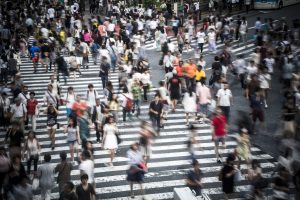All eyes are on Japan as the Tokyo Olympics goes ahead under a state of emergency and without spectators in an effort to curb the rapid rebound of coronavirus infections in the capital.
The emergency declaration came after an intensive quasi-state of emergency and a third state of emergency, which ended on June 11. That has led to public confusion and questions over the effectiveness of the current approach.
Tokyo is currently facing a fifth wave of infections. For the first time in two months, new daily infections in the city exceeded 1,000 on Tuesday, June 13. Friday saw 1,410 new cases, the highest daily count in January. The number of newly infected people over 65 is on the decline but people in their 20s and 30s account for 47 percent of the total.
The rapid acceleration in infections is being attributed to the spread of the Delta strain and an increase in the number of people spending more time in major downtown areas. Cell phone location data showed that the downtown population in Tokyo increased for five consecutive weeks and is heading toward the baseline levels from before the emergency declaration. According to a Tokyo metropolitan government official, there is a serious concern that the pace of infections will continue to increase. “We can’t find any factors that indicate an immediate downward trend. There’s a good chance infections will increase for some time,” the official told NHK.
Tokyo has fallen under three states of emergency this year and transitional quasi-state of emergency, which carries fewer restrictions on businesses and narrows restrictions to high-risk areas rather than the entire prefecture. Both approaches have focused on bars and restaurants that serve alcohol, but a state of emergency allows the government to demand business closures and a reduction of venue capacity to 5,000, while a quasi-state of emergency requires restaurants close at 8 p.m. and stop serving alcohol after 7 p.m. and permits a spectator capacity of 10,000 at large scale events.
The government originally planned to extend the intensive quasi-state of emergency for the duration of the Olympics, but instead declared a state of emergency in an effort to put a break on social gatherings involving alcohol and removing masks. Last week Prime Minister Suga Yoshihide called for “tougher measures” on eating establishments, which the hospitality industry criticized as a suicide mission after a seemingly endless set of restrictions. The hospitality industry has hit back at the government’s high-pressure tactics to force businesses to shorten business hours. Some restaurants are willing to pay a non-compliance fine of up to $3,000 to continue to serve alcohol and operate at longer hours. Last week the government retracted plans to request liquor suppliers and wholesalers not to do business with restaurants and have financial institutions stop financing restaurants in an effort to pressure restaurants to comply.
In the lead-up to the resurgence of infections, the line between orders and requests to close or shorten business hours became increasingly blurred. In May, when the third state of emergency was extended, theater and entertainment venues were allowed to operate under certain conditions while movie theatres were asked to close. The third state of emergency and intensive quasi-state of emergency throughout May, June, and July led to a confusing mix in which some downtown areas were split between businesses closures, shorter business hours, and businesses choosing non-compliance.
As the weather warms and restaurants and bars face alcohol restrictions, staff and students have taken to drinking outside after work. In May, Tokyo Governor Koike Yuriko warned against socializing on the street in popular nightlife districts and has made repeated calls for people “to stay home” or “to go home early.” The government has continued to request that residents refrain from leaving their homes unnecessarily and has set a 70 percent corporate teleworking goal.
Experts are concerned that the current rebound has come about faster than previous peaks. The total number of coronavirus-related deaths exceeded 15,000 on July 14, which is an increase of 5,000 in just two and a half months. Experts have criticized the government for repeating the same mistake seen in the previous two emergency declarations, which were lifted prematurely despite signs of a rebound. The government cited coronavirus fatigue behind the reluctance to extend the state of emergencies until daily infections fall below 100. But putting off an emergency declaration this time may have been influenced by the hope of allowing domestic spectators to attend the Olympics.

































